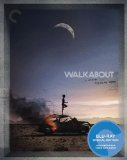| Reviews & Columns |
|
Reviews DVD TV on DVD Blu-ray 4K UHD International DVDs In Theaters Reviews by Studio Video Games Features Collector Series DVDs Easter Egg Database Interviews DVD Talk Radio Feature Articles Columns Anime Talk DVD Savant Horror DVDs The M.O.D. Squad Art House HD Talk Silent DVD
|
DVD Talk Forum |
|
|
| Resources |
|
DVD Price Search Customer Service #'s RCE Info Links |
|
Columns
|
|
|
Walkabout
The Criterion Collection // Unrated // May 18, 2010
List Price: $39.95 [Buy now and save at Amazon]
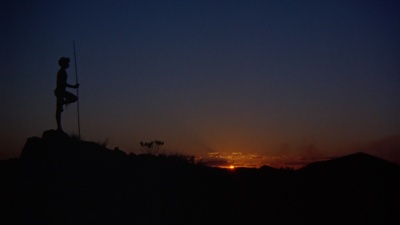 |
| [click on the thumbnail to enlarge] |
The cruelty is indescribable. This isn't Lord of the Flies where a group of children find themselves removed from civilization -- stranded in a harsh, unforgiving world -- purely by a stroke of misfortune. He seemingly couldn't even be bothered to have premeditated his suicide and the attempted double-murder of his children. It's a sudden break...an all-consuming impulse. This sister and brother aren't just stranded; they've been abandoned. They have only what food she was able to scuttle away as her father's gunshots rang out. It was meant for an afternoon meal, not to last them however many days...however many weeks...they're trapped in the Outback. They have no water. They have nothing resembling a weapon and not even any tools to speak of. The two of them are dressed in proper school uniforms, hardly attire suited for the sweltering desert heat or the sheer amount of climbing they're forced to do. They have no idea where they are...how close or how far any semblance of civilization may be. It could be quite some time before anyone realizes they're missing, and even then, who knows how long it'd take to find them in the vast expanse of the Australian Outback?
As their
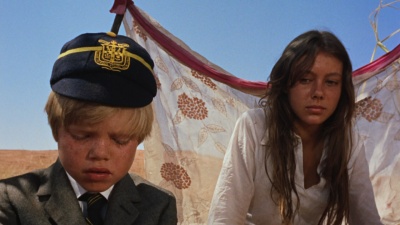 |
| [click on the thumbnail to enlarge] |
Walkabout is, in a word, entrancing. Even taken purely at face value, the core premise -- strangers in a strange land striving desperately to survive -- is immediately engaging. In the same way that Don't Look Now amounts to so much more than a murder-mystery in Venice and The Man Who Fell to Earth is anything but just another science fiction story of a crashlanded alien, Walkabout can be appreciated for its accessible premise but has so much more of substance to offer beyond that. One of the defining elements of the film is the concept of family: the geologist's grisly suicide and attempted murders of his own children, the sister trying bravely to shelter her brother from the madness that's transpired, and the surrogate family that's formed with the arrival of the Aborigine. Related to this is Roeg's exploration of the uneasy transition into adulthood...into responsibility, into a loss of innocence, and into the curiosity and discomfort of budding sexuality. I appreciate the fact that Jenny Agutter's teenager so immediately exhibits as much strength as she does. Even as things are at their most dire, our nameless heroine doesn't burst into hysterics. She instead remains remarkably cool and collected. As exceptionally far out of her element as she is, she's still clever enough to try to find the highest point she can to search out some semblance of civilization. I'm also intrigued by the way Walkabout approaches the concept of communication. When we first meet Agutter's character, she's taking some sort of voice lesson, but her ability and apparent willingness to communicate is limited to English. Her brother, on the other hand, quickly establishes a shorthand to chat with their Aborigine friend. The teenaged girl can't be bothered to try to learn the same, preferring instead to have her brother crudely translate for her.
Though Walkabout is rooted around these three central characters -- the two siblings and their Aborigine
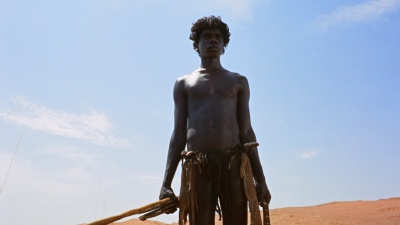 |
| [click on the thumbnail to enlarge] |
As is the case with all of Roeg's extraordinary work throughout the 1970s, there's so much more to explore in Walkabout than can possibly be addressed in a review such as this. As it is, this review is already threatening to become an essay. To shift focus elsewhere for a moment, the performances throughout the film very much warrant a proper discussion. Jenny Agutter was the only of the three leads to have any credits to her name at the time. Nicolas Roeg's young son Luc hadn't any background in acting beforehand, and the entire experience was alien to David Gulpilil, an Aborigine not at all far removed from the character he's portraying. All three performances are immediately engaging. The limited reliance on dialogue, the authenticity of seeing these actors in the Outback rather than on a backlot standing in for the same, and Roeg's fascination with capturing the natural and untainted...it strikes me as genuine and sincere in a way I've rarely seen. The characterization is impressively rich despite the fact that the three of them ultimately speak so little. Even from my very first viewing of Walkabout a decade ago, I felt as if I immediately knew these characters despite the fact that we're never even told what their names are.
This is a film that reveals more and more with each successive viewing, one that's endlessly engaging emotionally, intellectually, and viscerally. The word 'masterpiece' is bandied out perhaps too freely by reviewers and online film critics, to the point where the term almost seems to have no meaning; Walkabout is among the select few that absolutely deserves the title. DVD Talk Collectors' Series.
Video
Before
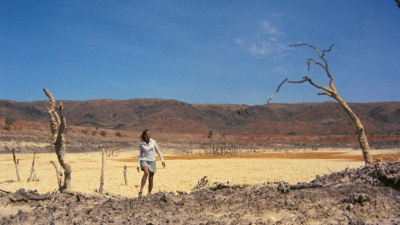 |
| [click on the thumbnail to enlarge] |
Again, those unfamiliar with Roeg's work should note that the cinematography here can be rather soft, and this Blu-ray disc doesn't offer home theater eye candy in the traditional sense. As a longtime admirer of the director's work and of Walkabout in particular, I'm floored by the presentation that Criterion is offering here and enthusiastically recommend this Blu-ray disc.
Walkabout's AVC encode spills over slightly onto the second layer of this BD-50 disc. The film is presented without any mattes to reveal an aspect ratio of 1.78:1. This decision, as is the case with every element of this Blu-ray disc, has been approved by Nicolas Roeg.
Audio
Perhaps even more impressive is Walkabout's 24-bit, uncompressed monaural soundtrack. The PCM audio is astonishingly clean and clear, easily trumping my already high expectations. Walkabout's dialogue isn't marred by the strained, muffled quality I've often come to expect from films of this vintage, and the line readings are balanced flawlessly in the mix. The film's eclectic score is rendered with remarkable warmth and clarity as well, and both the music and atmospheric effects are impressively full-bodied. No clicks, pops, or hiss ever intrude. This is a spectacular effort by Criterion and easily ranks among the best monaural soundtracks I've had the pleasure of experiencing.
There are, needless to say, no remixes or dubbed soundtracks to be found on this Blu-ray disc. English subtitles for the deaf and hard of hearing have been provided, though.
Extras
- Gulpilil: One Red Blood (56 min.; SD): All
three of Walkabout's stars are showcased in extras all their own, and by far the lengthiest of the lot is this hour-long documentary on the life of David Gulpilil. He's certainly a sufficiently fascinating subject for a documentary. This is a man that director Philip Noyce describes as perhaps the most accomplished actor in all of Australia, and we see Gulpilil on-stage in a wonderfully tailored suit standing in front of scores of enthusiastic people at a screening. Moments later, the camera cuts to a bare-chested Gulpilil in a remote stretch of Australia, clowning around with a fish he'd just caught in his mouth. One Red Blood explores that dichotomy -- of a man raised outside the influence of modern civilization who has chosen to continue rooting himself in that untraditional lifestyle...of a people slowly fading away...rather than embrace the colder comforts offered elsewhere. Gulpilil routinely performs in films with budgets of many millions of dollars yet lives in a ramshackle home and finds securing food and water to be a constant, grueling struggle. We learn quite a bit about the declining numbers of the Aboriginal people and the beliefs they closely hold, including what may be the first extended look at a circumcision ceremony being prepared.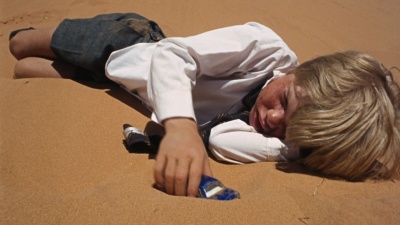
[click on the thumbnail to enlarge]
One Red Blood also features excerpts from a number of vintage interviews, perhaps most memorably Gulpilil admitting that he isn't quite sure what the ending of Walkabout is meant to represent, exactly. Excerpts from such films of Gulpilil's as Crocodile Dundee, The Tracker, Mad Dog Morgan, Rabbit Proof Fence, and Storm Boy are offered here as well, including a few behind-the-scenes clips and glowing comments from the likes of Rolf de Heer and Philip Noyce. I greatly enjoyed this documentary, and One Red Blood is well-worth setting aside the time to watch.
- Luc Roeg Interview (21 min.; HD): The youngest member of Walkabout's cast -- and an accomplished film producer in his own right -- strikes a perfect balance between warm nostalgia and critical insight throughout this conversation. Despite having been of such a tender age at the time, Roeg has no shortage of stories to share, the standout perhaps being the...well, attempted destruction of that VW Bug. Among the many other highlights are Roeg speaking at length about how making this movie with his family ultimately complements the material, marveling at the almost supernatural talents of David Gulpilil, his father's unsurpassed skill at most every conceivable aspect of filmmaking, and how an outsider's perspective of Australia shaped a different film than a director from the continent's own shores likely would have. Quite a number of high resolution stills snapped during production are featured throughout the interview as well.
Though all of the extras on this Blu-ray disc are encoded in high definition, Luc Roeg's is the only one to have been natively produced in that format. The Gulpilil and Agutter features are both upscaled from interlaced, standard definition video.
- Jenny Agutter Interview (20 min.; SD): The last of Walkabout's three interviews is carried over from French television. Agutter discusses how Nicolas Roeg's wife first discovered her at the age of 14 and noting why it's for the best that another two years would pass before cameras began rolling on Walkabout. Much like Luc Roeg, her eyes brighten when chatting about the familial atmosphere on the set of the film, and Agutter too takes particular delight in speaking about David Gulpilil's personality and innate understanding of the mechanics of cinema. Also discussed here are Apple Corps' brief involvement with the project, Walkabout's premiere at Cannes, and how the ambiguity of the film's ending contrasts with the fate
of one character in the original novel.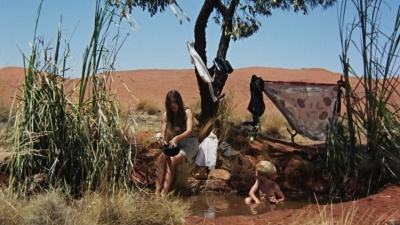
[click on the thumbnail to enlarge]
- Audio Commentary: The commentary with Nicolas Roeg and Jenny Agutter from Criterion's previous releases of Walkabout has found its way onto this Blu-ray disc as well. I'll admit that this track renders Agutter's twenty minute interview elsewhere on the disc rather moot; she offers many of the same comments -- sometimes almost verbatim -- here. Aside from Agutter discussing the relaxed shooting schedule and that she was uncertain if she was going to continue pursuing acting leading up to the release of Walkabout, most everything else she speaks about is addressed in her interview. She is, as ever, so warm and personable that the overlap is more than tolerable. Those who only have so much time to devote to viewing extras may wish to consider skipping Agutter's interview in favor of this audio commentary, however.
The reason this commentary track is to my mind such an essential listen is the presence of Nicolas Roeg. I'm a great fan of Roeg's commentary for The Man Who Fell to Earth, and his discussion here melds together that same sort of immediately charming personality with spectacular insight. He too offers a strong sense of what it must've been like to be a part of this production, from a lack of location scouting -- something I never would've guessed, given what an integral role the landscape has in this breathtakingly photographed film -- all the way to Jenny Agutter's trailer gradually crumbling into ruin. Roeg discusses the mindset behind the somewhat jarring sequence with the weather researchers, and among his other standout notes are Gulpilil's dances being driven by instinct rather than rigid choreography and why he doesn't consider the graphic imagery of animals being butchered to be any more obscene than the alternative. I particularly enjoy hearing Roeg as he speaks about filmmaking in general: the grammar of cinema, why he frowns on formal film education, and what might be the most brilliant summary on the concept of story I think I've ever heard. It's just a terrific listen and, the film aside, easily the highlight of this Blu-ray disc.
- Trailer (4 min.; SD): The last of Walkabout's extras is a lengthy theatrical trailer. Though the trailer is presented in 1080p24, the resolution is far too limited for me to list it as proper high definition.
The Final Word
Walkabout was once slated to be one of Criterion's initial releases on Blu-ray, and though this disc has been quite some time in coming, it's proven to be more than worth the wait. Walkabout remains one of the most towering achievements of the 1970s -- arguably the most creatively fruitful decade in the history of cinema -- and its entrancing power is only heightened by its marvelous presentation in high definition. The film looks and sounds better here than perhaps it ever has, and Walkabout's release on Blu-ray is bolstered further by a compelling selection of extras. Though some may grouse that there ought to be more extras to warrant this website's most enthusiastic recommendation, I cannot consider rating Walkabout anything less than DVD Talk Collectors' Series.
|
| Popular Reviews |
| Sponsored Links |
|
|
| Sponsored Links |
|
|
| Release List | Reviews | Shop | Newsletter | Forum | DVD Giveaways | Blu-Ray | Advertise |
|
Copyright 2024 DVDTalk.com All Rights Reserved. Legal Info, Privacy Policy, Terms of Use,
Manage Preferences,
Your Privacy Choices | |||||||









